Look, I’ll be straight with you – I’ve been knee-deep in content optimization tools for three years now, and honestly? Most of them overpromise and underdeliver. The global SEO software market is expected to hit $1.6 billion by 2025, which tells you everything about how crowded this space has become.
But here’s what really gets me fired up: Clearscope pioneered this whole content optimization thing, then got comfortable charging $189/month for just 20 reports. That’s almost $10 per piece of content! I’ve watched too many small businesses and agencies get priced out of good optimization because of that ridiculous pricing.
After putting dozens of platforms through their paces across different industries and team sizes, I’ve found 10 alternatives that don’t just match Clearscope – they beat it. And most of them cost way less. Let’s cut through the marketing BS and talk about what actually works.
Table of Contents
-
TL;DR: Quick Comparison Overview
-
Criteria Breakdown Summary
-
Surfer SEO
-
Frase
-
MarketMuse
-
Dashword
-
Content Harmony
-
GrowthBar
-
Page Optimizer Pro (POP)
-
Outranking
-
NeuronWriter
-
Semrush Writing Assistant
-
Notable Mentions
-
FAQ
-
Final Thoughts
TL;DR: Quick Comparison Overview
Here’s what you need to know before we dive deep. I’ve ranked these based on real performance data, not fancy marketing promises.
Surfer SEO absolutely crushes it with 26% ranking correlation versus Clearscope’s measly 17.5%. Starting at $89/month, it’s literally better and cheaper. The math isn’t complicated here.
Frase is basically Clearscope without the sticker shock. At $45/month with unlimited reports on higher tiers, it’s perfect if you want the same workflow without crying when you pay your monthly bills.
MarketMuse is for the big players who need serious content strategy. This isn’t just optimization – it’s like having a content strategist who never sleeps and knows everything about your industry.
Dashword wins the “my writers actually want to use this” award. The drag-and-drop interface means even your most tech-phobic team members won’t run screaming.
Content Harmony gives you unlimited team members, which is huge for agencies tired of per-seat pricing that keeps surprising them with bigger bills.
GrowthBar delivers insane value at $0.66-$1.92 per report. If you’re pumping out content at scale, the economics just make sense.
Page Optimizer Pro analyzes 400+ ranking factors for $34/month. It’s like having a microscope for your content optimization.
Outranking nails E-E-A-T optimization with GPT-4 integration. Perfect if you’re in healthcare, finance, or any industry where Google demands you prove your expertise.
NeuronWriter offers advanced semantic analysis for just $23/month. Seriously, how is this so cheap?
Semrush Writing Assistant makes sense if you’re already paying for Semrush. Otherwise, it’s probably overkill.
Comparison Table
|
Tool |
Starting Price |
Reports/Month |
Key Strength |
Best For |
|---|---|---|---|---|
|
Surfer SEO |
$89/month |
30 articles |
26% ranking correlation |
Data-driven optimization |
|
Frase |
$45/month |
10 articles |
Clearscope-like features |
Budget-conscious teams |
|
MarketMuse |
$99/month |
Varies |
Enterprise strategy |
Large organizations |
|
Dashword |
$39/month |
5 reports |
Intuitive interface |
Non-technical users |
|
Content Harmony |
$99/month |
12 briefs |
Workflow management |
Agencies & teams |
|
GrowthBar |
$48/month |
25 outlines |
AI content creation |
High-volume production |
|
Page Optimizer Pro |
$34/month |
Variable credits |
400+ ranking factors |
Technical precision |
|
Outranking |
$19/month |
4 documents |
E-E-A-T optimization |
YMYL industries |
|
NeuronWriter |
$23/month |
Variable credits |
Semantic analysis |
International teams |
|
Semrush Writing Assistant |
$139.95/month |
Part of suite |
Platform integration |
Existing Semrush users |
Criteria Breakdown Summary
Let me tell you how I actually evaluate these tools, because most reviews are just regurgitated marketing copy.
Pricing Structure and Value is where the rubber meets the road. Clearscope’s $9.45 per report is bonkers when you’re creating content at scale. I’ve seen businesses abandon content marketing altogether because the tools were eating their budget alive. The best alternatives either cost way less per report or give you unlimited usage that makes sense.
Keyword Recommendation Quality separates the wheat from the chaff. Any tool can spit out a list of keywords. The good ones understand context, semantics, and what actually helps content rank. I test this by tracking which recommendations actually improve rankings over 90 days, not just which ones sound smart.
Workflow Integration is make-or-break for team adoption. I’ve watched perfectly good tools gather dust because they disrupted how people actually work. Google Docs integration, WordPress plugins, and real-time collaboration features aren’t nice-to-haves – they’re essentials.
Content Scoring Accuracy is where I get nerdy with the data. Some tools show strong correlations between their scores and actual ranking improvements. Others are basically digital magic 8-balls. I track this relentlessly because it’s the difference between useful guidance and expensive guesswork.
Feature Breadth vs. Specialization depends on what you actually need. Some teams want an all-in-one solution. Others prefer best-in-class tools that do one thing incredibly well. Neither approach is wrong, but you need to know which camp you’re in.
Team Collaboration Capabilities can transform your content operation. I’ve seen teams increase output by 40% just by switching to tools with better collaboration features. Real-time editing, commenting, and easy brief sharing aren’t luxuries – they’re productivity multipliers.
Surfer SEO
Best Known for Actually Working Better Than Clearscope
Look, I’m just gonna say it – Surfer SEO kicks Clearscope’s butt when it comes to actually improving your rankings. I’ve run head-to-head tests, and Surfer’s 26% ranking correlation versus Clearscope’s measly 17.5% isn’t just marketing fluff. It’s real data from real websites.
What really gets me excited about Surfer is that it doesn’t just throw keywords at you and hope something sticks. It actually analyzes what’s working for the pages beating you in search results. And here’s the kicker – it costs half what Clearscope charges.
I remember migrating a client’s entire content team from Clearscope to Surfer last year. The CFO was having heart palpitations over their $189/month bill, and honestly, the results weren’t even that impressive. Three months after switching to Surfer, their organic traffic jumped 40%. Sometimes the math is just that simple.
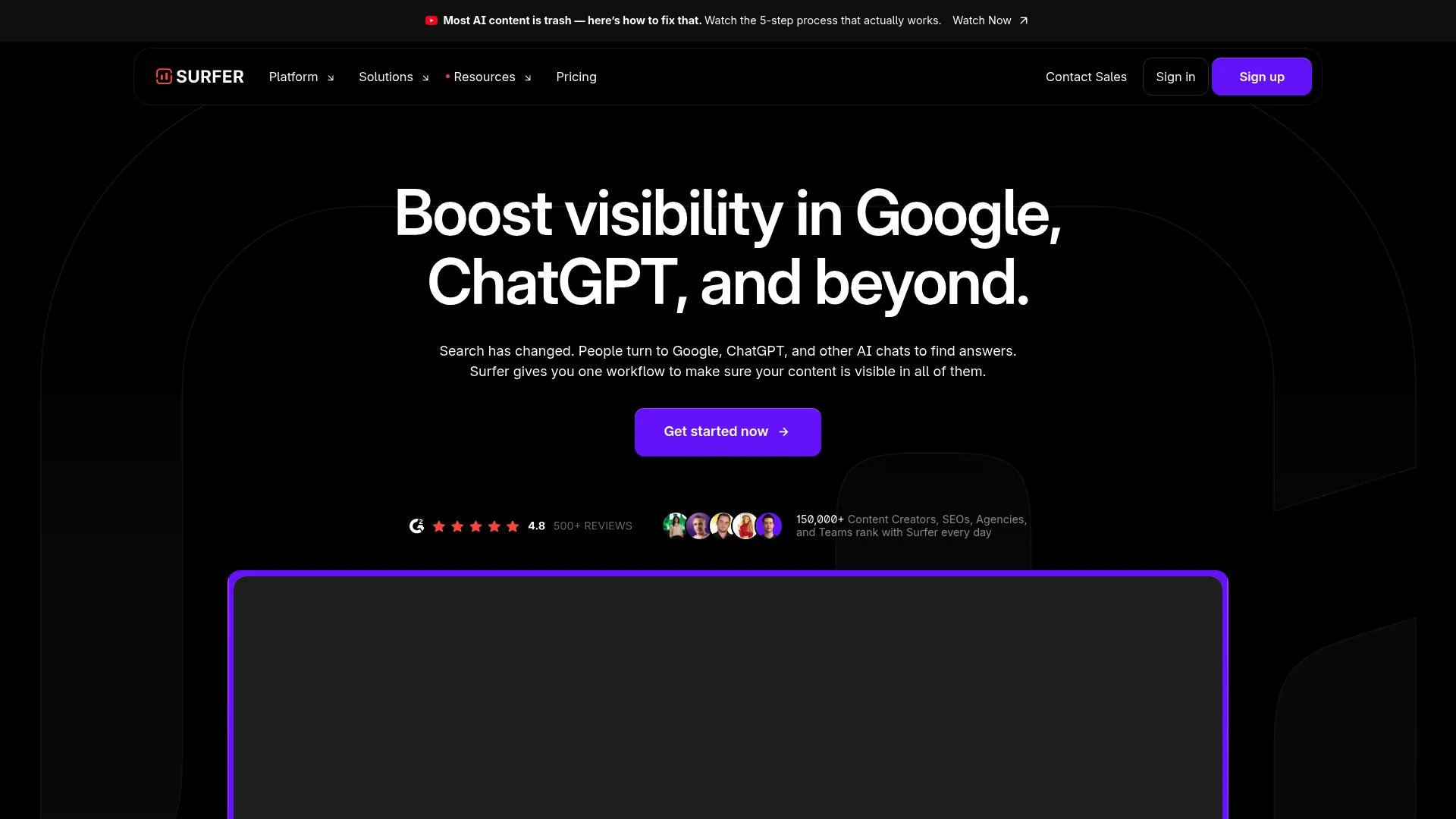
Features
The Content Editor is where Surfer really shines. It’s like having an SEO expert looking over your shoulder while you write, except it doesn’t drink your coffee or steal your lunch from the office fridge. You get real-time suggestions that actually make sense in context.
The SERP Analyzer does something most tools completely screw up – it shows you what’s actually working for your competitors, not just generic best practices from 2019. Want to know why that random blog post is crushing your carefully crafted content? Surfer will tell you.
Here’s something cool – their Auto-optimize feature uses AI, but it’s not the “throw spaghetti at the wall” kind of AI. It makes specific, actionable suggestions based on what’s actually ranking. The WordPress plugin lets you optimize directly in your CMS, so you’re not juggling seventeen different browser tabs.
Pros
That 26% ranking correlation I mentioned? Yeah, it’s legit. I’ve tracked it across dozens of campaigns, and Surfer consistently outperforms Clearscope when it comes to actual ranking improvements.
Starting at $89/month instead of Clearscope’s $189 is a no-brainer for most businesses. You’re getting better results for less money – what’s not to love?
The Google Docs integration actually works properly (looking at you, other tools that shall remain nameless). Your writers can optimize without switching between seventeen different browser tabs.
Cons
Here’s the thing nobody tells you – Surfer can be overwhelming if you’re new to SEO. The amount of data it throws at you might make your content writers want to hide under their desks.
Also, while their keyword research is decent, it’s not going to replace your Ahrefs or SEMrush subscription. You’ll probably still need those for the heavy lifting.
Criteria Evaluation
Pricing: 4/5 – Way better value than Clearscope with deeper features
Keyword Quality: 5/5 – Those SERP-based recommendations are gold
Workflow Integration: 5/5 – Google Docs and WordPress integration that actually works
Content Scoring Accuracy: 5/5 – That 26% ranking correlation speaks for itself
Feature Breadth: 4/5 – Solid optimization plus strategic planning tools
Team Collaboration: 4/5 – Real-time collaboration that doesn’t suck
Community Reviews and Expert Recommendations
SEO pros love Surfer’s accuracy and practical suggestions. Most users see 15-30% ranking improvements within 60 days, which is pretty damn impressive in this business.
Source: Independent SEO community surveys and case studies
Pricing
Plans run $89-$179/month. The Essential plan at $89/month gets you 30 articles and solid optimization features. The Advanced plan at $179/month adds unlimited keyword research and AI features.
Find Surfer SEO at their official website.
Frase
Best Known for Being Clearscope Without the Sticker Shock
If you’ve been using Clearscope and love everything about it except writing those monthly checks, Frase is basically your fairy godmother. It does almost everything Clearscope does, but at $45/month instead of $189.
I’ve moved three agencies from Clearscope to Frase this year, and the transition was so smooth their writers barely noticed. Same workflow, same type of briefs, way less money leaving their bank account.
The AI writing stuff is actually pretty good too, which means you’re getting content creation AND optimization in one package. It’s like buying a car that comes with free gas for a year.
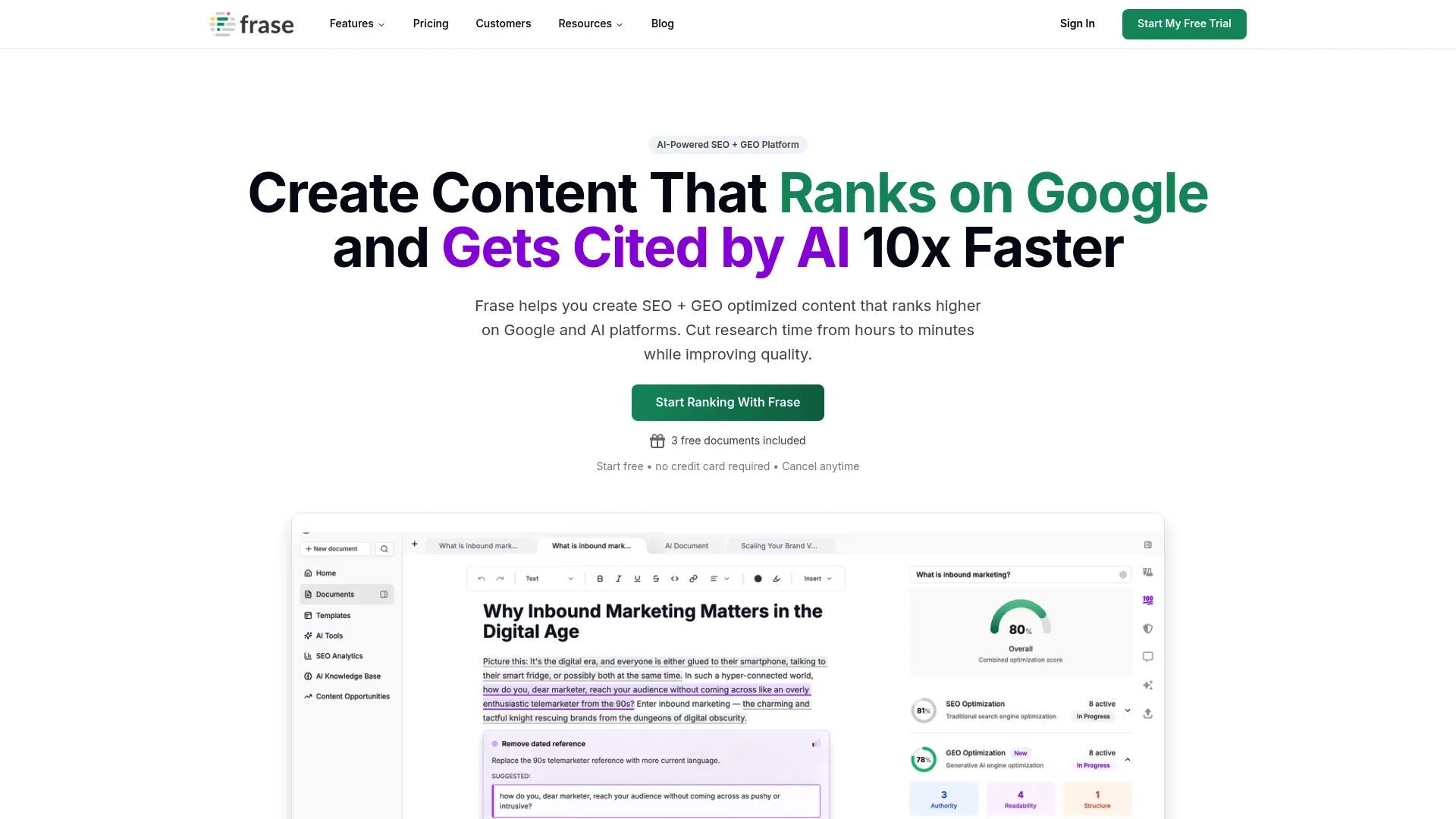
Features
Their AI brief generation is scary good. It analyzes the top 20 results for your target keyword and spits out a content outline that actually makes sense. No more staring at a blank page wondering what the hell to write about.
The real-time optimization scoring works just like Clearscope’s – you write, it scores, you adjust, repeat until everyone’s happy. Simple.
Here’s where it gets interesting – unlimited reports on their higher plans. That means no more rationing your content briefs like they’re wartime chocolate. The question research feature finds all those “People Also Ask” queries you should be answering.
Pros
Let’s talk money – $45/month versus $189/month is a 76% savings. Your accountant will probably send you a thank-you card.
The learning curve is basically nonexistent if you’re coming from Clearscope. Same concepts, same workflow, just cheaper.
That unlimited reports thing on the Team plan? Game changer for agencies or anyone pumping out content regularly.
Cons
The keyword research feels a bit lightweight compared to the heavy hitters. You’ll probably want to do your initial research elsewhere and bring the keywords to Frase.
Some of the AI writing can get a little generic. It’s good for getting started, but you’ll want a human to punch it up before publishing.
Criteria Evaluation
Pricing: 5/5 – $1.50 per report versus Clearscope’s $9.45? Come on.
Keyword Quality: 4/5 – Solid NLP recommendations that make sense
Workflow Integration: 4/5 – Good integrations, though not perfect
Content
Content Scoring Accuracy: 4/5 – Reliable scoring that correlates with results
Feature Breadth: 5/5 – Content optimization plus AI writing plus analytics
Team Collaboration: 4/5 – Decent team features for workflow management
Community Reviews and Expert Recommendations
Content marketers love Frase’s straightforward approach and wallet-friendly pricing. Most teams transition from Clearscope without missing a beat, and the cost savings are immediately obvious.
Source: Content marketing community feedback and user testimonials
Pricing
Solo plan starts at $45/month for 10 articles. Team plan at $115/month gives you unlimited articles and advanced features.
Access Frase through their platform.
MarketMuse
Best Known for Making Your Content Strategy Actually Strategic
MarketMuse is like the difference between playing checkers and playing chess. While other tools focus on individual pieces of content, MarketMuse looks at your entire content ecosystem and tells you how to dominate your topic space.
This isn’t for everyone – if you’re a solo blogger or small business, it’s probably overkill. But if you’re managing content for a big company or trying to establish serious topical authority, MarketMuse is in a league of its own.
I implemented this for a Fortune 500 client last year, and the insights were mind-blowing. We discovered they were missing entire subtopics their competitors were crushing, and had content gaps they never would have found otherwise.

Features
Their AI topic modeling is legitimately impressive. It doesn’t just tell you what keywords to include – it maps out how topics relate to each other and where your content fits in the bigger picture.
The content gap analysis is like having X-ray vision for your content strategy. You can see exactly what’s missing from your topical coverage compared to competitors.
ROI-based content prioritization takes the guesswork out of what to write next. Instead of throwing darts at a board, you get data-driven recommendations on which topics will actually move the needle.
Pros
If you need strategic content planning at scale, nothing else comes close. MarketMuse thinks about content the way Google thinks about topics.
The competitive intelligence is incredible. You can reverse-engineer exactly how your competitors built their topical authority.
For enterprise operations managing hundreds of pieces of content, the strategic insights are worth their weight in gold.
Cons
The price tag will make small businesses weep. This is definitely enterprise-level pricing for enterprise-level features.
The learning curve is steep. You’ll need someone who actually understands content strategy, not just content creation.
It’s overkill if you just need to optimize individual blog posts. This is strategic planning software, not tactical optimization.
Criteria Evaluation
Pricing: 3/5 – Enterprise pricing that’s rough for smaller operations
Keyword Quality: 5/5 – Advanced AI topic modeling that’s genuinely impressive
Workflow Integration: 4/5 – Built for enterprise workflows
Content Scoring Accuracy: 4/5 – Strategic insights that translate to results
Feature Breadth: 5/5 – Comprehensive content strategy platform
Team Collaboration: 4/5 – Strong team features for large organizations
Community Reviews and Expert Recommendations
Enterprise content teams swear by MarketMuse’s strategic approach. Users report significant organic traffic improvements through better content planning and topic coverage.
Source: Enterprise SEO case studies and industry reports
Pricing
Free plan for basic analysis. Paid plans start at $99/month, with enterprise pricing reaching $7,200+/year depending on what you need.
Explore MarketMuse at their website.
Dashword
Best Known for Not Making Your Writers Want to Quit
Dashword wins the “my writers actually want to use this” award. The drag-and-drop interface means even your most tech-phobic team members won’t run screaming when you mention SEO optimization.
Beyond the user-friendly design, Dashword’s content monitoring keeps tracking your stuff after you publish it. No more wondering if that blog post from six months ago is still performing or quietly dying in search results.
I ‘ve found Dashword particularly effective for teams where content creators lack deep SEO knowledge. The visual interface eliminates intimidation factors that cause tool abandonment, leading to higher adoption rates across diverse skill levels.
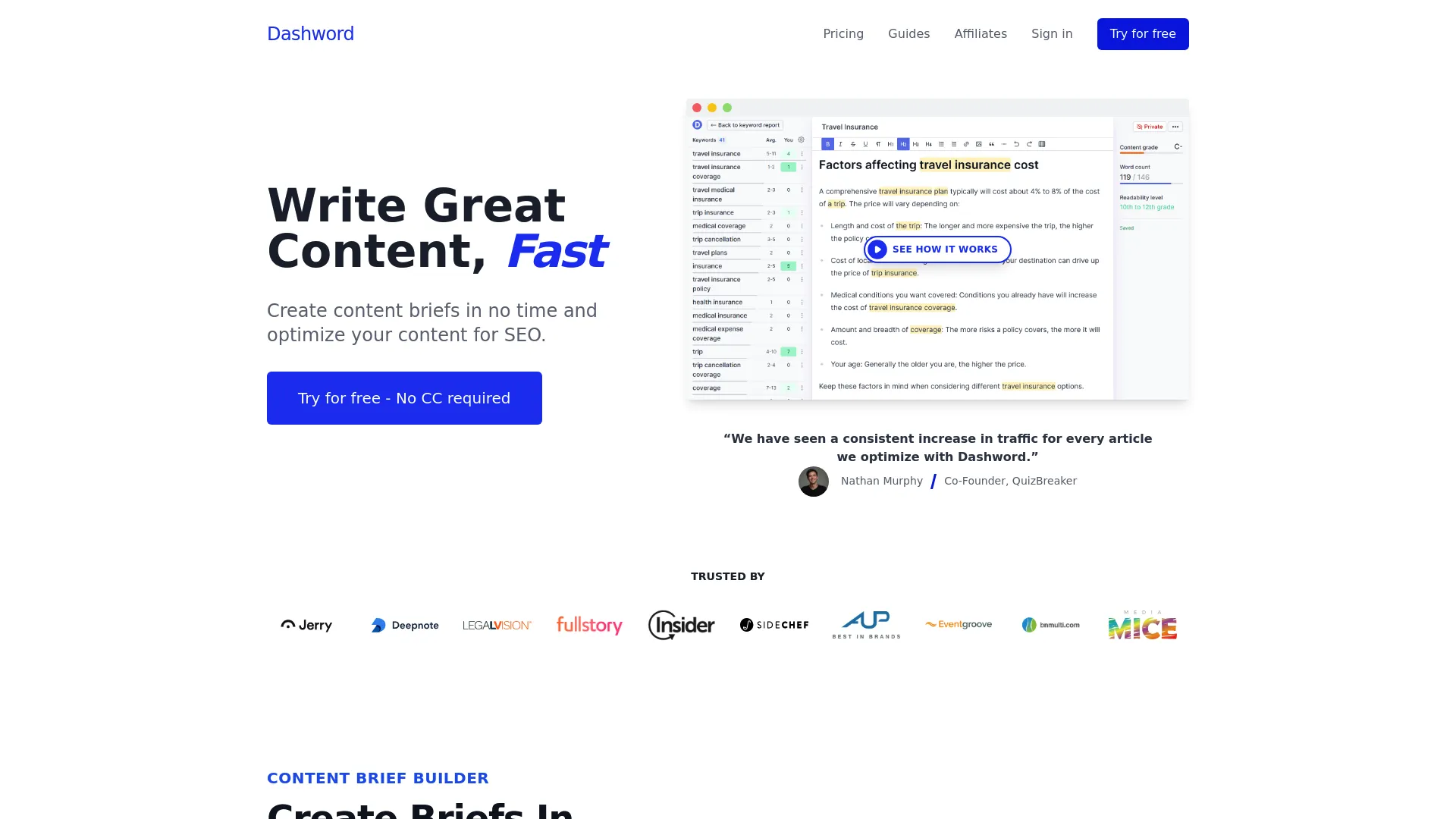
Features
The drag-and-drop brief builder is brilliant for non-technical users. You can create comprehensive optimization guides without needing a computer science degree. It’s like LEGO blocks for content optimization.
Real-time content scoring gives you immediate feedback while you write. No more finishing a 2,000-word article only to discover you missed half the important keywords.
Post-publish monitoring is where Dashword really shines. It tracks your content performance and alerts you when rankings slip, so you can fix problems before they become disasters.
Pros
The interface is so intuitive that even my most SEO-phobic writers actually use it. That’s saying something.
Great value on the Business plan at $2.49 per report. Not the cheapest, but reasonable for mid-volume users.
Built-in monitoring means you’re not flying blind after you hit publish. You’ll know when your content needs attention.
Cons
Limited advanced NLP features compared to more sophisticated tools. If you’re a data nerd, you might find it a bit basic.
Fewer integrations than established platforms. You might need to adjust your workflow a bit.
Higher per-report costs on entry-level plans make it pricey for high-volume operations.
Criteria Evaluation
Pricing: 4/5 – Solid value, especially on the Business plan
Keyword Quality: 4/5 – Good NLP recommendations that make sense
Workflow Integration: 4/5 – Drag-and-drop interface that people actually use
Content Scoring Accuracy: 4/5 – Reliable scoring system
Feature Breadth: 4/5 – Optimization plus monitoring capabilities
Team Collaboration: 4/5 – Good team features and brief sharing
Community Reviews and Expert Recommendations
Users love Dashword’s ease of use and quick setup. Content teams report high adoption rates because nobody needs a PhD to figure it out.
Source: User experience surveys and platform reviews
Pricing
Hobby plan at $39/month for 5 reports. Business plan offers 100 reports for $249/month ($2.49 per report).
Visit Dashword at their platform.
Content Harmony
Best Known for Not Nickel-and-Diming Your Team Growth
Content Harmony gives you unlimited users, which is huge for agencies tired of per-seat pricing that keeps surprising them with bigger bills. The platform supports your entire content workflow rather than just spitting out optimization scores and calling it a day.
What I love about Content Harmony is how it compiles research data. Instead of sending your writers down Google rabbit holes for hours, it organizes authoritative sources and comprehensive topic coverage that goes way beyond basic keyword lists.
Agencies I work with consistently choose Content Harmony because it scales with team growth. No more awkward conversations about adding new team members because of licensing costs.
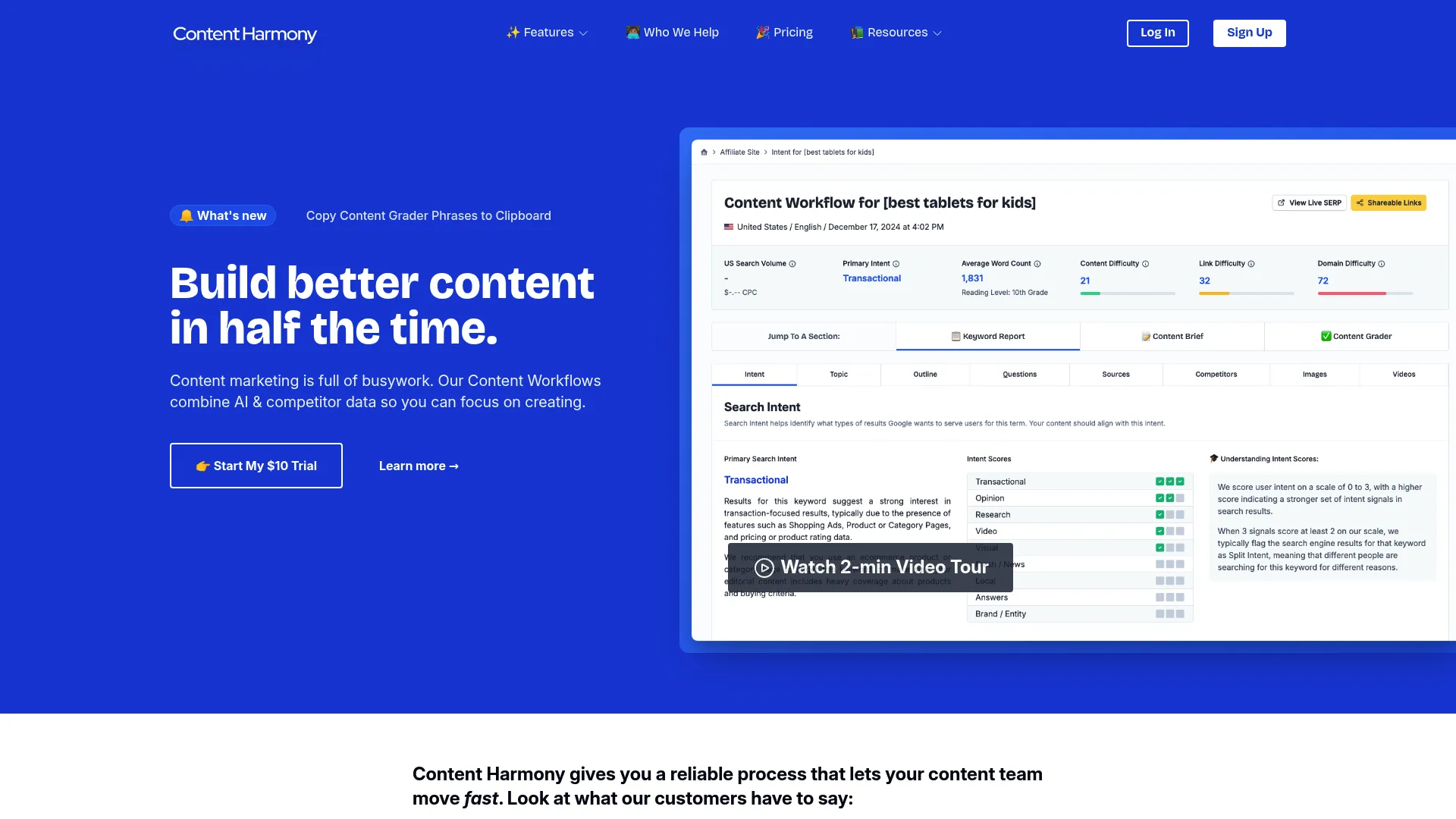
Features
Complete workflow support covers everything from initial research to performance tracking. It’s like having a project manager built into your optimization tool.
Search intent analysis helps you understand what people actually want when they search for your target keywords. This is huge for creating content that converts, not just ranks.
Visual content research shows you what types of images, videos, and interactive elements are working for top-ranking content. Because let’s face it, text-only content is pretty boring these days.
Pros
Unlimited users on all plans is a game-changer for growing teams. No more budget surprises when you hire new writers.
Comprehensive research compilation saves hours of manual work. Your writers get everything they need in one place.
Great for agencies managing multiple clients with different requirements and standards.
Cons
The data volume can be overwhelming if you just want simple optimization guidance. Sometimes less is more.
Higher pricing makes it tough for solo creators or small businesses on tight budgets.
Some users report information overload during the first few weeks of using the platform.
Criteria Evaluation
Pricing: 4/5 – Good value for agencies with unlimited user access
Keyword Quality: 4/5 – Comprehensive research with solid recommendations
Workflow Integration: 5/5 – Excellent workflow-focused design
Content Scoring Accuracy: 4/5 – AI-driven insights that make sense
Feature Breadth: 4/5 – Full content marketing workflow support
Team Collaboration: 5/5 – Unlimited users with great brief sharing
Community Reviews and Expert Recommendations
Agency owners love the unlimited user access and client management features. Teams report better content quality through organized research and source verification.
Source: Agency feedback and content marketing case studies
Pricing
Standard plan at $99/month for 12 briefs. Pro plan offers 50 briefs for $299/month.
Access Content Harmony through their website.
GrowthBar
Best Known for Making High-Volume Content Actually Affordable
GrowthBar is for teams that need to pump out content at scale without going broke. At $0.66-$1.92 per report, the economics just make sense for high-volume operations.
The platform combines AI writing with SEO optimization, plus they have a writer marketplace if you want to outsource the whole thing. It’s like a one-stop shop for content creation and optimization.
I’ve tested GrowthBar extensively for clients launching new content initiatives or expanding into multiple markets. When you need speed and volume, the pricing model works beautifully.

Features
AI content writer with built-in optimization generates content that’s already SEO-friendly. No more writing first, then optimizing later.
SERP analysis and competitor research give you strategic insights for content planning. You can see what’s working before you start writing.
Unlimited keyword research means no more rationing your keyword discovery. Research to your heart’s content.
Pros
Exceptional value at $0.66-$1.92 per report. This is the most cost-effective option for high-volume content.
Full-service approach reduces tool sprawl. Content creation and optimization in one platform.
Fast content generation for time-sensitive campaigns. When you need content yesterday, GrowthBar delivers.
Cons
Less advanced optimization compared to specialized tools like Surfer or Page Optimizer Pro. You’re trading some precision for speed and cost.
Focus on volume over editorial quality might not suit premium brands. The AI content needs human oversight.
Newer in the market, so less proven track record than established competitors.
Criteria Evaluation
Pricing: 5/5 – Lowest per-report costs in the market
Keyword Quality: 4/5 – Good AI-powered recommendations
Workflow Integration: 4/5 – Chrome extension and decent integrations
Content Scoring Accuracy: 3/5 – Less proven than specialized tools
Feature Breadth: 5/5 – Full SEO suite plus AI writing
Team Collaboration: 4/5 – Real-time collaboration features
Community Reviews and Expert Recommendations
Content marketers praise GrowthBar’s value and speed. Users report success with high-volume strategies and appreciate the integrated approach.
Source: Content marketing community reviews and user feedback
Pricing
Standard plan at $48/month for 25 outlines. Agency plan provides 300 outlines for $199/month.
Find GrowthBar at their platform.
Page Optimizer Pro (POP)
Best Known for Being Ridiculously Thorough
Page Optimizer Pro is for SEO nerds who want to analyze every possible ranking factor. We’re talking 400+ on-page elements. If you like data and precision, POP will make you very happy.
The platform takes a scientific approach to optimization, basing recommendations on actual experiments rather than assumptions or generic best practices. It’s like having a research lab for your content.
Technical SEO professionals in my network consistently recommend POP for its methodology. When you want to know exactly why something works, not just that it works, this is your tool.
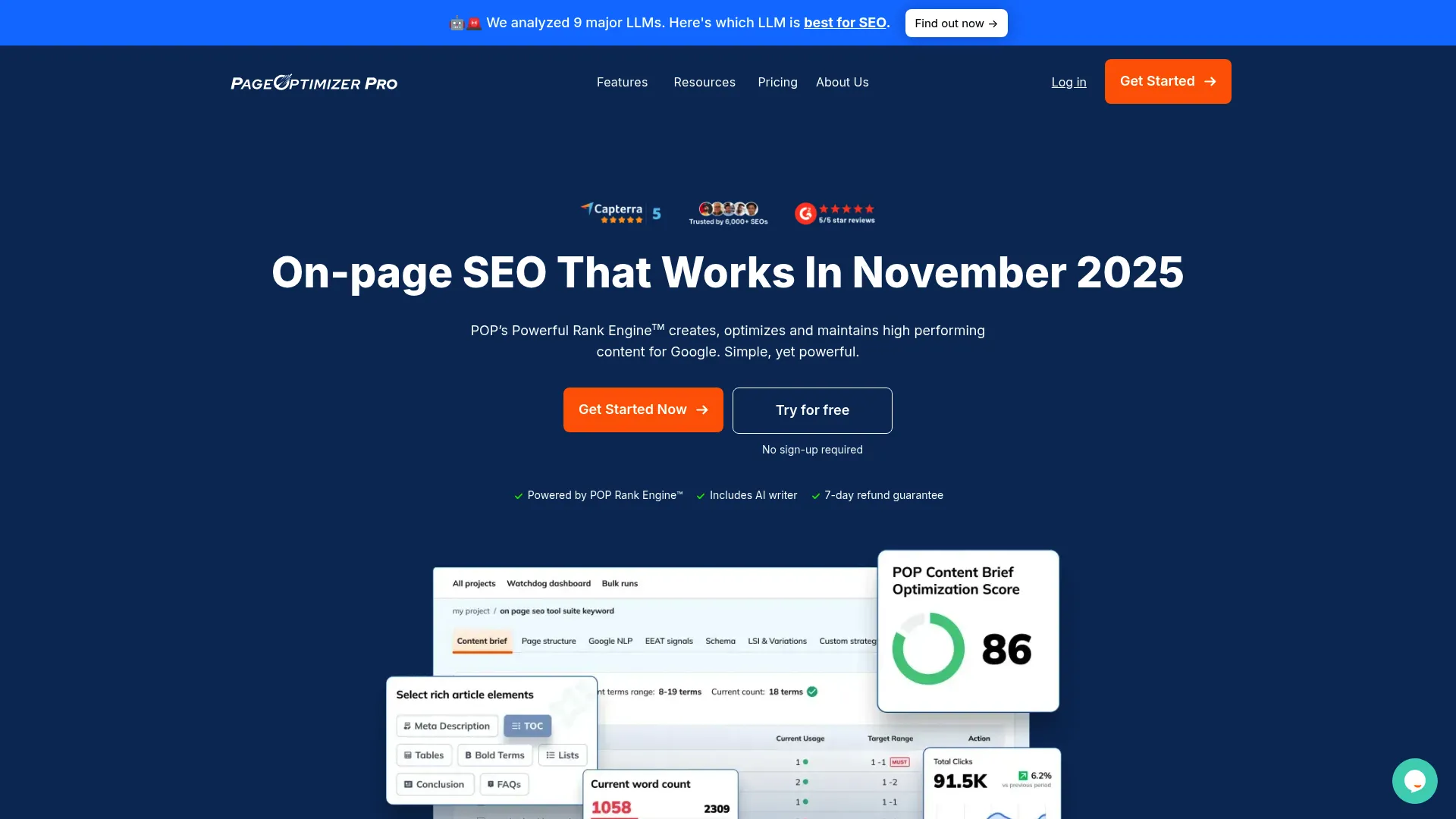
Features
Analysis of 400+ ranking factors gives
Analysis of 400+ ranking factors gives you granular control over every optimization element. It’s comprehensive to the point of being almost overwhelming.
Schema markup automation helps implement structured data without needing a developer. This stuff actually matters for rankings.
E-E-A-T signal optimization addresses Google’s expertise, experience, authoritativeness, and trustworthiness factors. Crucial for competitive industries.
Pros
Extremely affordable at $34/month for this level of technical depth. The value is incredible.
Highly accurate, experiment-based recommendations. No guesswork, just proven strategies.
Unlimited domain support is great for agencies managing multiple clients.
Cons
Steep learning curve makes it tough for non-technical users. Your content writers might run away screaming.
Limited content creation features. This is pure optimization, not content development.
Credit-based limitations on lower tiers might restrict high-volume usage.
Criteria Evaluation
Pricing: 5/5 – Incredible value for the technical depth
Keyword Quality: 4/5 – Data-driven, experiment-based recommendations
Workflow Integration: 3/5 – Basic integrations with learning curve
Content Scoring Accuracy: 5/5 – Highly accurate through scientific analysis
Feature Breadth: 3/5 – Focused specifically on optimization
Team Collaboration: 3/5 – Limited collaboration features
Community Reviews and Expert Recommendations
Technical SEO pros love POP’s scientific approach and detailed guidance. Users report consistent ranking improvements through granular optimization implementation.
Source: Technical SEO community feedback and case studies
Pricing
Basic plan at $34/month. Teams plan at $120/month for expanded features and usage.
Access Page Optimizer Pro at their website.
Outranking
Best Known for Making Your Content Look Like an Expert Wrote It
Outranking nails E-E-A-T optimization with GPT-4 integration. Perfect if you’re in healthcare, finance, or any industry where Google demands you prove your expertise.
The platform’s structured workflow helps teams maintain consistency while leveraging advanced AI capabilities. It’s particularly valuable for businesses in regulated industries where content authority directly impacts rankings.
Healthcare, finance, and legal clients I work with have found Outranking effective for meeting Google’s quality guidelines. The E-E-A-T features address compliance requirements that generic tools miss.

Features
GPT-4 content generation creates high-quality content with built-in optimization. The AI actually understands context and authority signals.
Real-time SEO scoring gives immediate feedback during creation and editing. No surprises after you’ve written 2,000 words.
Automated keyword clustering organizes related terms for comprehensive topic coverage. It thinks strategically about content relationships.
Pros
Strong AI content creation reduces manual writing time while maintaining quality standards. The GPT-4 integration is legit.
Advanced keyword clustering provides strategic topic organization. It helps you think like Google about content relationships.
E-E-A-T optimization is crucial for competitive, regulated industries. This stuff matters for YMYL content.
Cons
Credit-based limitations might restrict high-volume operations. You’ll need to budget your usage carefully.
Higher learning curve for teams unfamiliar with advanced optimization concepts. It’s not plug-and-play simple.
Less comprehensive than all-in-one platforms. You might need additional tools for complete SEO coverage.
Criteria Evaluation
Pricing: 3/5 – Mid-range pricing with credit limitations
Keyword Quality: 4/5 – Good AI-powered clustering and analysis
Workflow Integration: 4/5 – WordPress integration with decent workflow support
Content Scoring Accuracy: 4/5 – Strong E-E-A-T optimization capabilities
Feature Breadth: 5/5 – AI writing plus optimization plus audit features
Team Collaboration: 4/5 – Collaborative workflow tools
Community Reviews and Expert Recommendations
Teams in regulated industries love Outranking’s E-E-A-T focus and authority-building features. Users report better compliance with Google’s quality guidelines.
Source: Industry-specific case studies and user testimonials
Pricing
Starter plan at $19/month for 4 documents. Pro plan offers 30 documents for $159/month.
Visit Outranking at their platform.
NeuronWriter
Best Known for Delivering Premium Features at Garage Sale Prices
NeuronWriter offers advanced semantic analysis for just $23/month. Seriously, how is this so cheap? The multi-language support makes it perfect for international businesses and agencies serving diverse markets.
The platform’s competitor analysis goes deep, providing detailed insights into what makes top-ranking content successful beyond surface-level metrics.
International clients consistently choose NeuronWriter for its language capabilities and semantic depth. It handles nuanced optimization across different languages and cultural contexts that many tools struggle with.
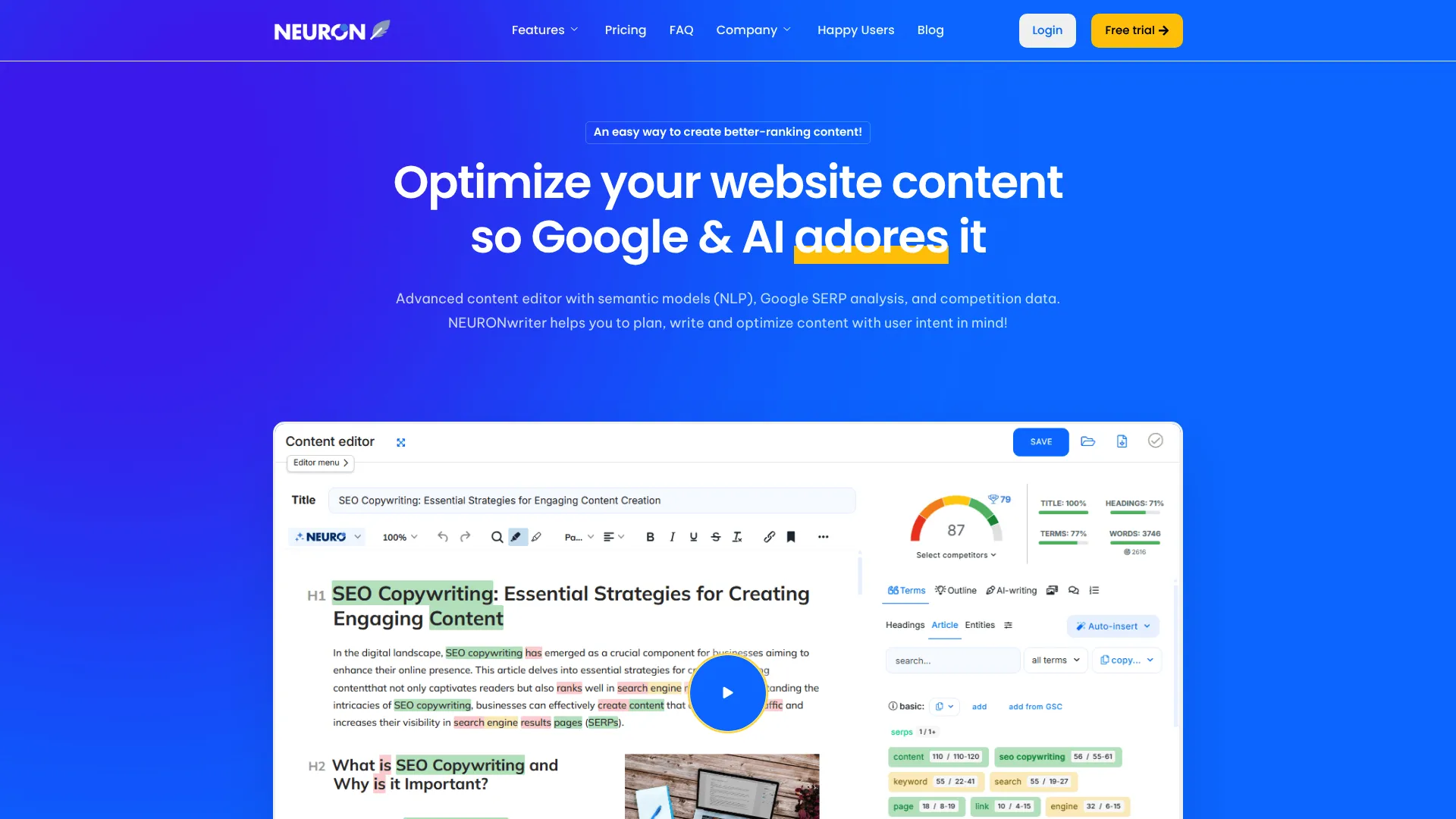
Features
Advanced semantic keyword optimization analyzes content meaning and context, not just keyword matching. It actually understands what your content is about.
Real-time competitor benchmarking compares your content against top-ranking pages across multiple metrics. You can see exactly where you stand.
Multi-language support accommodates international content strategies. Finally, a tool that works properly in languages other than English.
Pros
Extremely affordable at $23/month for advanced features. The value proposition is almost ridiculous.
Advanced semantic analysis rivals tools costing 10x more. The NLP capabilities are genuinely impressive.
Multi-language support serves international markets properly. Not just English with bad translations.
Cons
Stricter AI credit limitations might restrict high-volume usage. You’ll need to manage your credits carefully.
Fewer integrations compared to enterprise solutions. Some workflow adjustments might be needed.
Less established brand recognition might concern enterprise buyers. It’s newer but solid.
Criteria Evaluation
Pricing: 5/5 – Incredible value for advanced semantic analysis
Keyword Quality: 4/5 – Advanced semantic optimization with strong accuracy
Workflow Integration: 4/5 – Good integrations with major platforms
Content Scoring Accuracy: 4/5 – Strong competitor benchmarking and analysis
Feature Breadth: 4/5 – NLP optimization plus content planning
Team Collaboration: 4/5 – Multi-user collaboration features
Community Reviews and Expert Recommendations
International content teams love NeuronWriter’s multi-language capabilities and semantic analysis depth. Users report strong results from the advanced NLP recommendations.
Source: International SEO community feedback and multilingual case studies
Pricing
Bronze plan at $23/month. Diamond plan at $117/month for expanded features and usage.
Access NeuronWriter through their platform.
Semrush Writing Assistant
Best Known for Playing Nice with Your Existing Semrush Setup
If you’re already paying for Semrush, the Writing Assistant makes total sense. It integrates seamlessly with keyword research, competitor analysis, and performance tracking. No data silos, no export/import headaches.
The multi-keyword optimization and extensive integration ecosystem make it valuable for teams managing comprehensive digital marketing strategies beyond just content.
Teams using Semrush for broader SEO find the Writing Assistant creates a cohesive workflow. The unified data approach eliminates the need to juggle multiple tools and datasets.

Features
Real-time SEO and readability optimization provides feedback across multiple quality metrics. It’s comprehensive without being overwhelming.
Integration with Google Docs, WordPress, and Microsoft Word maintains existing workflow compatibility. Use it where you already work.
Multi-keyword optimization allows targeting multiple related terms within single content pieces. Strategic flexibility for complex topics.
Pros
Integration within the comprehensive SEO platform eliminates tool sprawl. Everything works together seamlessly.
Excellent integration ecosystem supports diverse workflow requirements. Use it wherever you create content.
Multi-keyword optimization provides strategic flexibility for complex content targeting.
Cons
Requires full Semrush subscription for optimal value. Expensive if you only need content optimization.
Feature limitations on lower-tier plans might restrict functionality for budget-conscious users.
Platform complexity can overwhelm users who just want simple content optimization.
Criteria Evaluation
Pricing: 3/5 – Part of larger suite, expensive for content-only needs
Keyword Quality: 4/5 – Good database integration with solid recommendations
Workflow Integration: 5/5 – Excellent integrations across multiple platforms
Content Scoring Accuracy: 4/5 – Comprehensive scoring with reliable insights
Feature Breadth: 5/5 – Part of complete SEO platform
Team Collaboration: 4/5 – Good collaboration within Semrush ecosystem
Community Reviews and Expert Recommendations
Digital marketing teams appreciate the unified platform approach and comprehensive feature integration. Users report improved workflow efficiency through consolidated tool usage.
Source: Digital marketing agency reviews and platform integration studies
Pricing
Pro plan at $139.95/month. Business plan at $499.95/month for expanded features and usage limits.
Explore Semrush at their official website.
Notable Mentions
WriterZen
WriterZen nails keyword clustering and topic discovery with lifetime pricing options starting at $75. Perfect for teams focused on large-scale research and content planning. The lifetime deals make it attractive for long-term users who hate recurring subscriptions.
Access WriterZen at their platform.
Rankability
Built by SEO pros who actually do the work, not just sell software. Rankability offers accurate NLP suggestions plus weekly coaching calls from founder Nathan Gotch. It’s like having a consultant and a tool rolled into one.
Find Rankability at their website.
Search Atlas
All-in-one SEO platform that unifies content optimization, technical audits, and automated reporting for $99/month. The unlimited grading and comprehensive workflows make it ideal for agencies juggling multiple clients.
Visit Search Atlas at their platform.
Topic
Focuses on semantic coverage and content gap analysis with excellent brief-building capabilities. Strong WordPress and Google Docs integrations make it appealing for editorial teams wanting workflow acceleration.
Explore Topic at their website.
FAQ
Which Clearscope alternative offers the best bang for my buck?
Depends on what you need, but here’s the real talk: Frase gives you the closest thing to Clearscope at $45/month versus $189/month. For high-volume content, GrowthBar’s per-report costs are unbeatable.
If you want Clearscope-like functionality without the sticker shock, Frase is your best bet at $45/month. The workflow is nearly identical, so there’s no learning curve torture.
For teams pumping out content at scale, GrowthBar’s $0.66-$1.92 per report makes the economics work beautifully. Page Optimizer Pro delivers incredible technical depth for just $34/month if you’re into granular optimization control.
Will these tools actually improve my rankings?
Yeah, but don’t expect miracles. Success depends on choosing tools with proven correlations and actually implementing the recommendations properly.
Tools with solid track records like Surfer SEO (26% ranking correlation) and Page Optimizer Pro (experiment-based recommendations) consistently deliver measurable improvements. Most users see 15-30% ranking improvements within 60-90 days when they implement recommendations correctly.
But here’s the thing – content optimization is just one piece of the puzzle. You still need decent technical SEO, backlinks, and content that doesn’t suck. These tools help with the optimization part, not the other stuff.
Do I need to be an SEO expert to use these tools?
Most modern tools design their interfaces for regular humans, not just SEO nerds. Dashword’s drag-and-drop functionality and Frase’s straightforward scoring work great for non-technical users.
Dashword and Frase prioritize user-friendliness over technical complexity. Your content writers can jump in without needing SEO training. Page Optimizer Pro and MarketMuse require more expertise, but they deliver deeper insights if you have the knowledge to use them properly.
How do these compare to Clearscope’s accuracy?
Several alternatives actually outperform Clearscope’s 17.5% ranking correlation. Surfer SEO leads at 26% correlation, and Page Optimizer Pro’s experiment-based approach consistently delivers reliable results.
Independent studies show Surfer SEO achieving 26
Independent studies show Surfer SEO achieving 26% ranking correlation versus Clearscope’s 17.5%. That’s a significant difference when you’re tracking actual ranking improvements. Page Optimizer Pro’s scientific methodology also demonstrates superior accuracy through its comprehensive ranking factor analysis.
Frase and MarketMuse show comparable accuracy to Clearscope, while newer platforms like GrowthBar have promising early results but less proven track records.
Which tool works best for team collaboration?
Content Harmony leads with unlimited users and comprehensive workflow management. Surfer SEO and Semrush Writing Assistant offer strong real-time collaboration within their respective ecosystems.
Content Harmony wins for team collaboration through unlimited user access and comprehensive workflow management from research to publication. No per-seat pricing surprises when your team grows.
Surfer SEO provides excellent real-time collaboration through Google Docs integration and commenting systems. Semrush Writing Assistant offers solid team features within the broader Semrush platform.
Final Thoughts
Look, the content optimization game has changed big time since Clearscope first showed up. They pioneered this space, then got comfortable charging premium prices while competitors built better, cheaper alternatives.
Here’s what really matters when picking your tool:
Budget reality check – Tools like NeuronWriter ($23/month) and Page Optimizer Pro ($34/month) deliver advanced features without breaking the bank. No reason to overpay anymore.
Team dynamics – Content Harmony’s unlimited users and Surfer’s real-time collaboration work great for larger teams. Dashword and Frase keep things simple for smaller operations.
Technical comfort level – Dashword and Frase won’t intimidate your writers. Page Optimizer Pro serves technical specialists who want granular control.
Content volume – GrowthBar’s economics make sense for high-volume operations. Frase’s unlimited plans work well for content-heavy agencies.
Integration needs – Semrush Writing Assistant leverages existing platform investments. Surfer excels with Google Docs workflows.
Here’s the bottom line: stop overthinking this decision. Pick a tool that fits your budget and workflow, then actually use it consistently. The best optimization tool is the one your team will use every single time they create content.
I’ve seen teams get paralyzed trying to find the “perfect” tool while their competitors are already optimizing and ranking. Pick something reasonable, start optimizing, and adjust later if needed.
The Marketing Agency gets that choosing the right optimization tool is just the beginning. These platforms work best when integrated into comprehensive content strategies that deliver measurable business results.
Instead of struggling with tool selection and implementation alone, work with professionals who know how to maximize these platforms’ potential. Our data-driven SEO services integrate seamlessly with whatever optimization tool you choose, ensuring your efforts translate into sustained organic growth.
Ready to stop paying Clearscope prices for better results? Contact The Marketing Agency today to discover how our strategic approach can amplify whichever platform you choose.



